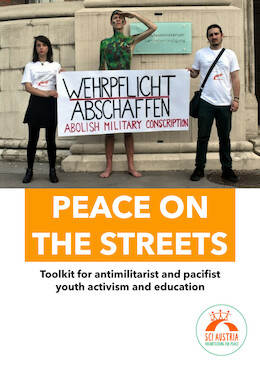Toolbox — For Training and Youth Work
All new tools in your inbox: Be the first to know about new tools for learning with our e-mail notifications.
Manual
Peace on the Streets: Toolkit for antimilitarist and pacifist youth activism and education
A toolkit collecting non-formal education methods as well as campaign strategy and project planning around peace, non-violence and antimilitarism.
Aims of the tool
Give youth workers and peace activists more tools todo non-formal education and plan successful street actions and campaigns around peace, non-violence and antimilitarism.
Description of the tool
The toolkit includes:
- Non-formal education methods around peace and antimilitarism
- Tips and tools on how to start a peace campaign and action
- Gives examples of different action forms and best practices of successful campaigns and actions
- Gives advice on strategic storytelling
- Talks about how to get money for campaigns and actions
Available downloads:
Disclaimer
SALTO cannot be held responsible for the inappropriate use of these training tools. Always adapt training tools to your aims, context, target group and to your own skills! These tools have been used in a variety of formats and situations. Please notify SALTO should you know about the origin of or copyright on this tool.
Tool overview

http://toolbox.salto-youth.net/2713
This tool addresses
Project Management
Behind the tool
The tool was created by
Service Civil International Österreich
in the context of
training course "Peace on the Streets" (1-7 June 2019, Vienna) and the project "Not Your Soldier" (2022).
The tool was published to the Toolbox by
Thomas Schallhart (on 14 January 2020)
and last modified
13 January 2020
Comments
No comments have been posted yet.
If you want to comment on this tool, you need to be signed in with your MySALTO account. Sign in now